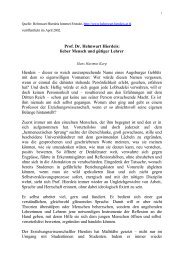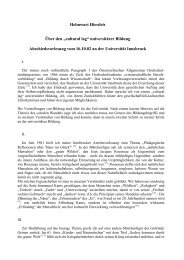Download pdf - Universität Innsbruck
Download pdf - Universität Innsbruck
Download pdf - Universität Innsbruck
Erfolgreiche ePaper selbst erstellen
Machen Sie aus Ihren PDF Publikationen ein blätterbares Flipbook mit unserer einzigartigen Google optimierten e-Paper Software.
36 Katharine Sarikakis<br />
social media users’ rights on the internet, and within this context, ‘freedom’ to association<br />
and expression in social media is appropriated by private companies with the aim to<br />
re/configure the user. In this process, the policies of privacy, copyright and ownership are<br />
being transformed to accommodate new dimensions of business models with the potential<br />
for enormous transformative powers at the cost of these same liberties.<br />
The study of governance of communications has gained ground in the field of media and<br />
culture as the international context of regulating the media has undergone considerable<br />
structural and discursive change (Chakravartty and Sarikakis, 2006). Media governance<br />
can be defined as the sum of institutions involved in a, actors, ideas and practices decisionmaking<br />
process that results into a system of regulation. The turn from ‘regulation’ to governance<br />
to describe the ways in which policy is made aims to reflect the complexity and<br />
multilevel involvement of various sets of actors that come from far beyond the traditional<br />
actors of state. Moreover, the governance of communication is a terrain where ideas and<br />
discourses play an important, yet often overseen, role. The very practice, internal policies<br />
and ideological framings of actions and positions within and by social media corporations,<br />
for example, as they operate within a specific regulatory context can also be considered<br />
part of the governance of communication. It is specifically the de facto set of practices that<br />
challenge established ways of ‘doing things’ and regulatory understandings of important<br />
cultural and political meanings, such as sharing, privacy, and public space. In this sense,<br />
this paper’s departing point is that the ways in which social media as organisations operate<br />
and interact with their users are underpinned predominantly by policies designed for the<br />
benefit of the organisation and whose relation to state law and international standards,<br />
whether antagonistic or compliant, shape in common a governing approach and a regulatory<br />
regime. At this point it is also important to note that lack of policy, hence the continuation<br />
of the status quo, also constitutes a form of policy (the decision to not make a decision)<br />
and is often expressed as policy vacuum, when new demands for provisions on new<br />
developments are yet to be met in law.<br />
In the case of social media, one of the issues that have dominated academic and public<br />
debate is that of privacy and the ways in which media organisations with the exemplary<br />
case of Facebook has pushed the boundaries of notions and practices of individuals’ right<br />
to privacy. This has been achieved by impacting upon two policy levels: on the one hand,<br />
Facebook, through its own policies, challenges existing norms of privacy law to monitor<br />
and profile users; on the other hand, it claims ownership of the ‘products’ provided by the<br />
users, such as documents, photographs, texts and information on personal taste. The combination<br />
of this new appropriation of data as objects of copyright and the challenging – or<br />
for some, abuse – of existing privacy standards constitute two sides of the same coin in the<br />
current political economy of social media (Sarikakis and Tsapogas, forthcoming 2012).<br />
Therefore, in this context the centrality of ‘sharing’ is the act (and ideological construct)<br />
that supports the monetisation and materialisation of what is largely immaterial and non-
















